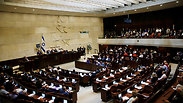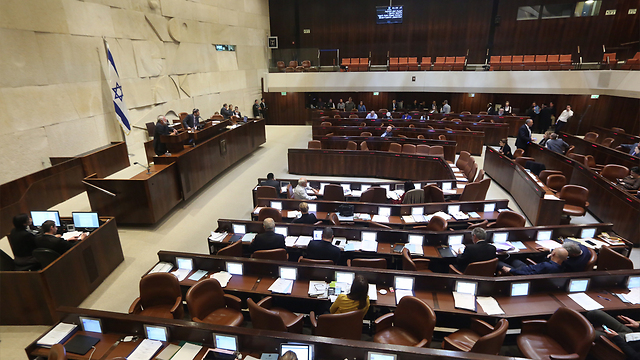
A raise for the entire legislature
צילום: רויטרס
MK's salaries rise 33% in a decade
The salaries of the president, judges and MKs, linked to the average wage, increases by 2.2% this year; government ministers' salaries, linked to the CPI, won't change.
Over the past ten years, MKs salaries rose from about NIS 30,000 per month to about NIS 40,000, a 33% increase, and it's about to go up again.
The salaries of the president, judges and MKs, linked to the average wage, is increasing this month by 2.2%, which means about an extra thousand shekels per month.
Government ministers (including the prime minister) and deputy ministers will not benefit from an increase, as their salaries are linked to the consumer price index. Until November, inflation in Israel was negative at a rate of 0.2% so only if December's CPI shows an increase will the ministers receive an increase. However, their salaries have increased by about 21% over the past ten years.
MKs will receive an increase of NIS 820 per month for a new monthly amount of NIS 41,350. The salary of the speaker of the Knesset will rise by NIS 1,175 to NIS 51,610. The president will receive an increase of NIS 1,360 to a new monthly total of NIS 59,250. The president of the Supreme Court's salary will increase by NIS 1,200 to NIS 54,500.
The prime minister's salary will remain static at NIS 47,485, as it has for the past two years, as have ministers' salaries at NIS 42,645. The state comptroller's salary will be the same, as it is automatically linked to match the ministers'.
The directors general of governmental ministries, local rabbis, municipality heads, religious council leaders, legal advisors and senior officials in governmental ministries, retired MKs and their widows all have salaries linked relatively (i.e., not the same wage) to the ministerial salary.
In the past, a few committees have discussed the correct way to link MKs' salaries. One recommendation from a committee headed by Prof. Haim Levy suggested disconnecting their automatic linkage with the average wage, but the Knesset rejected their recommendations.
Over the past two years, many MKs have foregone salary increases, which was only 2% two years ago and 1.3% last year. Only some announced that they would forego the increases entirely, with others saying that they would donate their raises to charity.
Two MKs told Mamon, Ynet's sister publication, that they had originally done this but gave it up. One said that he stopped his charitable donations after learning that most MKs hadn't given up the raise.
A senior MK from within the coalition told Mamon, "In the first month, I made a donation, but afterwards I realized that the raise only came to about NIS 600, and I didn't see that as an exceptional raise that required me to donate the money. I'm a mother of children. I have many expenses, and I'm barred from earning money in any place outside the Knesset. A net income of NIS 20,000 is lower than the salary of parliaments in other countries."











